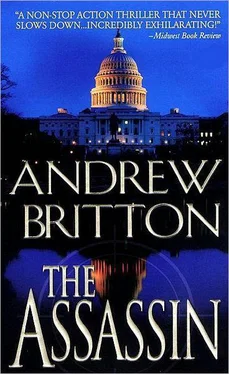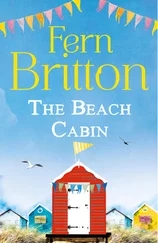Andrew Britton - The Assassin
Здесь есть возможность читать онлайн «Andrew Britton - The Assassin» весь текст электронной книги совершенно бесплатно (целиком полную версию без сокращений). В некоторых случаях можно слушать аудио, скачать через торрент в формате fb2 и присутствует краткое содержание. Жанр: Триллер, на английском языке. Описание произведения, (предисловие) а так же отзывы посетителей доступны на портале библиотеки ЛибКат.
- Название:The Assassin
- Автор:
- Жанр:
- Год:неизвестен
- ISBN:нет данных
- Рейтинг книги:3 / 5. Голосов: 1
-
Избранное:Добавить в избранное
- Отзывы:
-
Ваша оценка:
- 60
- 1
- 2
- 3
- 4
- 5
The Assassin: краткое содержание, описание и аннотация
Предлагаем к чтению аннотацию, описание, краткое содержание или предисловие (зависит от того, что написал сам автор книги «The Assassin»). Если вы не нашли необходимую информацию о книге — напишите в комментариях, мы постараемся отыскать её.
The Assassin — читать онлайн бесплатно полную книгу (весь текст) целиком
Ниже представлен текст книги, разбитый по страницам. Система сохранения места последней прочитанной страницы, позволяет с удобством читать онлайн бесплатно книгу «The Assassin», без необходимости каждый раз заново искать на чём Вы остановились. Поставьте закладку, и сможете в любой момент перейти на страницу, на которой закончили чтение.
Интервал:
Закладка:
Kealey knew how much those pages meant; everything hinged on the accuracy of the file’s contents. If the source recruited through ORACLE had given them good information, their chances were vastly improved, but Harper was right; under normal circumstances, an operation such as this, with the potential for enormous fallout if they were caught in the act, would be planned out weeks in advance and rehearsed extensively. This worrisome fact plucked at his confidence, but he’d made the decision, and he wasn’t about to back out now.
Room service arrived a moment later, and Kealey got up to collect the tray. When they were settled back in, Naomi said, “So, where should we start?”
He turned some of the documents so he could see them better, then selected a stack of paper. “Entry points. I have to get in fast and out of sight. If I can’t do that, nothing else will matter.”
“That makes sense. When are we going in?”
He looked at her sharply. “ I’m going in at four AM. That gives us five hours, allowing for time to test the radios.”
“Right.” When their eyes met, she offered a neutral smile instead of a broad grin. She had already gotten her way, and she knew rubbing it in wouldn’t help. “Well, there’s a lot of ground to cover, so let’s get started.”
The Hotel Victoria, located just off the Quai du Commerce, was a charmless, two-story structure of grey stone situated in the heart of Calais. The fourteen-room hotel was marked only by two small, flickering signs in bright blue and orange; otherwise, it could have been any other building on the block, and no better for it.
It was this very anonymity that had pulled Vanderveen in when they arrived in town late that evening, nearly four hours after Tabrizi’s death in Paris. They were met at the door by a bleary-eyed woman in her late fifties, who managed to greet them graciously, despite the late hour. They presented their passports and signed the registry as she searched for a free room. Handing over the keys, she smiled again and sent them up to the second floor.
The accommodations were adequate at best; the carpet was frayed, the furnishings scratched from years of use and lack of polish. The tile in the bathroom was cracked and stained, the wallpaper above the sink speckled with some unknown substance. The smell of antiseptic was overpowering. None of it mattered to Vanderveen; he had spent months, even years on end in places far worse. After pulling the curtains closed, he went into the bathroom and stripped down, then showered quickly. When he emerged ten minutes later, the room was dark, but he could see Raseen’s still form on the bed. She was still fully clothed, curled into a tight ball on top of the covers, her right side rising and falling with each shallow breath. He studied her for a minute, dispassionately picking out what was visible in the low light: the line of her square jaw, the gentle curve of her right shoulder, and the slope of her slender neck, which led up to a tangled nest of black-brown hair.
Watching her, he was reminded of her demonstration in the field near Dordogne, as well as the remarkable poise she had shown outside the hotel in Paris. She had witnessed and participated in a number of atrocities over the past few days, and yet she slept without stirring, her face serene in a sliver of moonlight. He thought this trait — the ability to sleep soundly after what she had seen and done — said more about her nature than any words he had been offered in Tartus. In this respect, he knew, they were much the same. With this realization, this acknowledgment, he felt something he had not felt in many years: affection for another human being. It was a strange, unnerving sensation, and for a moment, it left him confused and vaguely annoyed.
Shrugging off the momentary lapse, he closed the drapes with a swift tug, the clean white light blinking out in an instant; then he crossed to the door and slipped out quietly. He went down the narrow, musty flight of stairs and stepped into the street a moment later. Then he turned left and began walking south on the rue de Madrid.
Calais, a town of approximately 80,000, is located on the northern coast of France, overlooking the choppy gray waters of the English Channel. On a clear day, the white chalk cliffs of Dover can be seen from the shore with the naked eye; closer still is the fleet of ferries and commercial vessels that make the daily crossing. Although it has its charms, 90 percent of the town’s infrastructure was destroyed during World War II. As a result, there is little history to be found in the narrow streets of Calais, and even fewer architectural achievements. In fact, Calais is nothing more than a stopping point for most of the tourists entering France, as evidenced by the vast array of transportation options at hand. Vanderveen knew the Eurotunnel Terminal was located just southwest of the town, and there were a number of bus stations scattered about in convenient locations. Those facilities would become useful soon enough, but for now, Calais would suffice. It was as good a place as any to drop off the radar for a few days before moving again.
The pale quarter-moon slid behind a bank of clouds as he crossed the rue Mollien, making his way past the ornate redbrick facade of the train station. He entered the Parc Saint-Pierre a few minutes later, the Town Hall lit up to his left. The building’s 75-foot belfry towered over the trees and Auguste Rodin’s famous bronze, The Burghers of Calais.
Vanderveen stopped and appraised the work. He was well aware of its history. Completed in 1888, the sculpture was commissioned to commemorate an event that occurred during the Hundred Years’ War. According to documents dating from that period, the burghers were recognized as the city’s leaders, and, as such, were responsible for the defense of Calais. When Edward III laid siege to the city in 1347, Phillip VI of France commanded them to hold out indefinitely. When support failed to arrive, however, they were eventually forced to surrender, trading their lives and the keys to the city in exchange for the lives of the city’s inhabitants. Although the burghers were eventually spared by the English, it was this image of them — leaving the gates of Calais in utter defeat, each with a noose tied round his neck — that Rodin had immortalized in bronze more than a hundred years earlier.
Vanderveen stood before the figures for several minutes, listening intently, then walked in a wide circle to view the sculpture from a number of angles. While his interest in the piece was genuine — there was something about those pained expressions that he found intensely appealing — he was far more concerned with what was happening across the boulevard Jacquard. He’d passed the Church of Notre Dame nearly fifteen minutes earlier, and ever since then he’d felt uneasy. It was nothing he could see, which meant it was almost certainly his imagination, but he couldn’t shake the feeling that he was being watched.
The footpath wound its way through the park, bordered on both sides by misshapen trees, black silhouettes in the low ambient light. Vanderveen crossed the boulevard and continued on, making his way past a wartime telephone exchange. At some point, the unremarkable concrete structure had been converted to a museum; twin flagpoles stood outside the single entrance, the trees giving way to rows of dark green hedges. A sudden noise to his left caught his attention: the bray of a young man’s drunken laughter, followed immediately by a burst of profanity and a shouted rebuke.
Vanderveen felt a sudden spark of concern. He knew about the darker side of Calais, the side that could not be found in any guidebook, no matter how honest the author. Because of its proximity to England, the city was a gathering place for asylum seekers from all over the Near and Middle East, including some of the globe’s most troublesome regions: Sudan, Afghanistan, and the Palestinian territories. The hopeful masses had once congregated in the sweeping square next to the Parc Richelieu but moved around constantly to avoid the gendarmes, the local police. Vanderveen knew that by and large, the locals thought of these “asylum seekers” as nothing more than human waste, criminals forced from their native lands. Ironically, most of the criminal activity that stemmed from the immigrants’ presence was propagated by French nationals, blue-collar men who were quick to exhibit their frustration over the ongoing problem.
Читать дальшеИнтервал:
Закладка:
Похожие книги на «The Assassin»
Представляем Вашему вниманию похожие книги на «The Assassin» списком для выбора. Мы отобрали схожую по названию и смыслу литературу в надежде предоставить читателям больше вариантов отыскать новые, интересные, ещё непрочитанные произведения.
Обсуждение, отзывы о книге «The Assassin» и просто собственные мнения читателей. Оставьте ваши комментарии, напишите, что Вы думаете о произведении, его смысле или главных героях. Укажите что конкретно понравилось, а что нет, и почему Вы так считаете.












